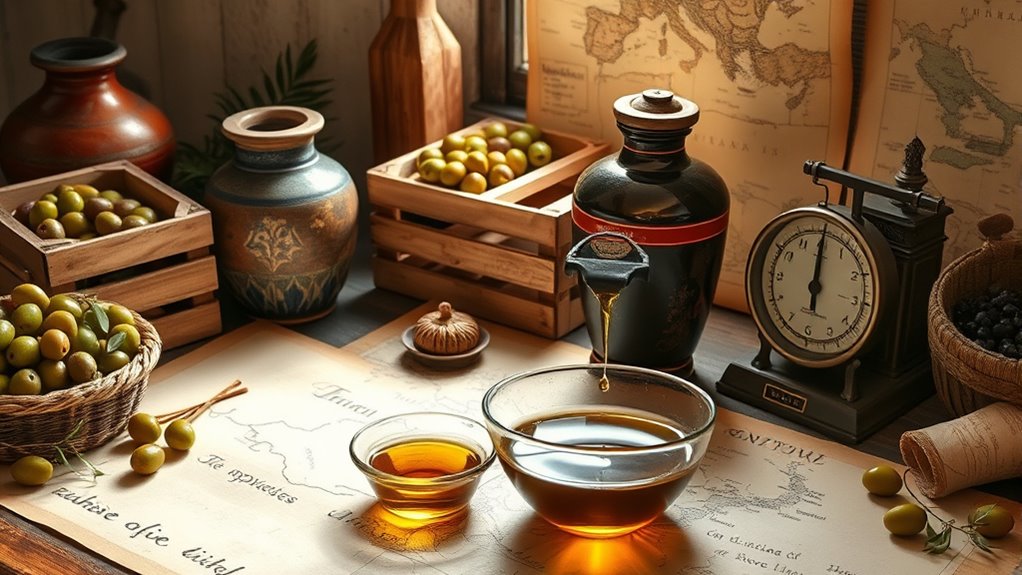You’ll discover that extra-virgin olive oil has been essential to Mediterranean culture for thousands of years, valued for flavor, health, and tradition. Its production methods evolved from simple pressing to modern cold-pressing, preserving its nutritional benefits. As a cornerstone of the Mediterranean diet, it provides healthy fats and antioxidants that support heart health. To understand how its rich history influences its health impact today, keep exploring its fascinating journey.
Key Takeaways
- Ancient Mediterranean civilizations perfected olive oil extraction methods, preserving traditions that influence modern production and quality standards.
- Extra-virgin olive oil has been central to cultural, religious, and medicinal practices for thousands of years.
- Traditional cold-pressing techniques help retain its nutritional benefits, including antioxidants and healthy monounsaturated fats.
- Its role in the Mediterranean diet emphasizes health benefits like heart health, anti-inflammatory properties, and oxidative stress reduction.
- Historical and archaeological evidence underscores its continued cultural significance and global recognition for healthful nutrition.

Throughout history, extra-virgin olive oil has played an essential role in Mediterranean cultures, prized not only for its flavor but also for its health benefits. Its significance stretches back thousands of years, shaping the culinary traditions and health practices of people living around the Mediterranean Sea. When you explore the roots of olive oil production, you’ll see how ancient civilizations perfected methods that are still in use today. The process involves carefully harvesting ripe olives, pressing them to extract oil, and guaranteeing quality control to produce the purest extra-virgin variety. This meticulous approach has enabled the Mediterranean diet to flourish, emphasizing the consumption of healthy fats from olive oil alongside fresh vegetables, fruits, and lean proteins. Additionally, the preservation of traditional olive oil production techniques ensures that the nutritional qualities remain intact, allowing consumers to benefit from the authentic health properties of this ancient elixir.
In the early days, olive oil was more than just a food; it was an essential commodity used for religious rituals, medicinal purposes, and even as a form of currency. Over centuries, techniques for olive oil production evolved, moving from simple pressing methods to more sophisticated systems that maximize yield and preserve nutritional quality. You can trace this evolution through archaeological findings and historical texts, which reveal how olive oil became deeply embedded in the culture and economy of Mediterranean societies. As the Mediterranean diet gained recognition worldwide, the importance of high-quality extra-virgin olive oil became even more apparent. Its rich content of monounsaturated fats, antioxidants, and anti-inflammatory compounds makes it a cornerstone of healthy eating.
When you incorporate extra-virgin olive oil into your diet, you’re adopting a tradition rooted in centuries of culinary wisdom. Its role in the Mediterranean diet is not just about flavor but also about nourishing your body. The antioxidants found in olive oil help combat oxidative stress, while healthy fats support heart health and maintain cholesterol balance. The production methods used today still honor the ancient practices, emphasizing cold-pressing and minimal processing to retain maximum nutritional value. This connection to tradition ensures that you receive not only authentic flavor but also the health benefits that have made olive oil a staple for generations. By understanding the history of olive oil production, you gain a deeper appreciation for its integral role in Mediterranean culture and its enduring reputation as a healthful, delicious fat source in your diet.
Frequently Asked Questions
How Is Extra-Virgin Olive Oil Different From Other Olive Oils?
You’ll notice extra-virgin olive oil stands out because of its superior olive oil extraction process, which involves cold-pressing without chemicals. This method preserves its natural flavors, giving it a richer, fruitier flavor profile compared to refined olive oils. Other types often undergo more processing, losing some flavor and nutrients. So, extra-virgin olive oil offers the purest taste and highest quality, making it the best choice for flavor and health benefits.
What Are the Best Ways to Store Extra-Virgin Olive Oil?
To maximize your extra-virgin olive oil’s shelf life, store it in a cool, dark place away from heat and light. Use airtight containers to prevent oxidation, and avoid storing near the stove or window. Keep the lid tightly sealed after each use, and don’t leave it exposed to air for long periods. Following these storage tips will help preserve the oil’s flavor and nutritional quality for months.
Does Olive Oil Have Any Known Health Risks?
Olive oil is a double-edged sword, offering health benefits but also potential risks. You might experience allergic reactions or gastrointestinal effects if you’re sensitive to olive oil. While rare, olive oil allergies can cause symptoms like skin irritation or breathing issues. Consuming too much can lead to digestive discomfort, so moderation is key. Always pay attention to how your body reacts and consult a healthcare professional if you notice adverse effects.
How Is the Quality of Olive Oil Determined?
You determine olive oil quality through grading and sensory evaluation. Olive oil grading classifies oils based on factors like acidity and purity, with extra-virgin being the highest. Sensory evaluation involves tasting and smelling the oil to assess flavor, aroma, and overall freshness. Look for a fruity, bitter, or pungent taste without rancid or moldy notes. High-quality olive oil scores well in both grading and sensory tests, ensuring you’re getting the best product.
Can Olive Oil Be Used for Skincare or Medicinal Purposes?
Yes, you can use olive oil for skincare and medicine. Olive oil skincare benefits include moisturizing dry skin, reducing inflammation, and acting as a gentle makeup remover. Olive oil medicine has antioxidant and anti-inflammatory properties, making it useful for soothing skin conditions or minor wounds. Just make certain you’re using high-quality extra-virgin olive oil to maximize its benefits and avoid irritation.
Conclusion
As you explore the rich history of extra-virgin olive oil, you’ll see how it’s more than just a culinary staple—it’s a health powerhouse. Did you know that countries like Spain and Italy produce over 70% of the world’s supply? This highlights its global significance. By appreciating its origins and nutritional benefits, you can make more mindful choices and enjoy the flavorful, heart-healthy qualities that have captivated cultures for centuries.









